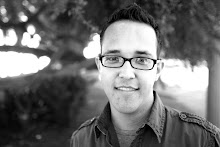During the first semester of my senior year at Pepperdine (last fall) I began recording some of my thoughts about God, church, etc. on my computer. Over the next while I will be posting those entries here:
Early morning October 17, 2006
Relativism. Somehow this thing, relativism, has become the enemy of the modern church. Our leaders see it as an evil, as evidence of the moral decline of society. It is what is wrong with our world, it is what has ruined it. Relativism is the cause of the evil that we see today—if only we could return to the days when everyone knew God as king and Jesus as savior. Except that what our leaders forget is that there never was such a time. Before relativism it was modernity. Before modernity it was enlightenment. Before that it was humanism and mysticism and superstition and paganism. There never was a perfect time, a golden age of Christianity. Relativism is not the evil that is bound to eat up all of Christianity—it is the contemporary culture within which we must make Christianity understandable.
In our increasingly relativistic society the absolutes which the church holds to are being laughed at and rejected and beaten down. People find silly the notion that some antiquated institution might hold the wholeness of truth, even if science and reason suggest otherwise. Why would someone join this silly antiquated church and be forced to say certain prayers, kneel a certain way, have absolutes shoved down their throat in a take-it-or-leave-it fashion, when she can just as easily go to Starbucks, give a small tip to the hard-working barista, have a good conversation, all while enjoying her tall half-caf caramel macchiato with fresh whipped cream? After all, Starbucks lends her status, a chance to be benevolent, a place to socialize, an interesting thought or two and something that she can’t get at most churches—a cup of gourmet coffee made just how she likes it.
The church has lost its relevance to our culture. It talks about morality and family values that are set in stone and any differing idea is heresy. It gives warm, empty welcomes followed by a hailstorm of brimstone and a firm warning against all the liberals. And above all, the church is sure to remind you that it is the truth. The church sees itself as the cure for relativism, but I can pretty well guarantee that a relativistic, post-modern culture is not going to be won over by a clunky institution declaring that it is absolutely right and absolutely better.
The church is faced with a dilemma—it can either hold onto dogma and a false sense of control while it dies off along with its few remaining members, or it can embrace honesty, humbly reexamining its identity, at the risk of being vulnerably authentic.
The problem with the current state of the church is that it has sacrificed honesty for the sake of a sense of control. With dogma and firmly placed absolutes, the church retains a vestige of the power it once possessed because at least it can still definitively and haughtily point out where others stumble. Dogma lends the church a sense of stability and even of self-righteousness because it knows with absolute certainty that it is holding firmly to the truth. But, sadly, it has ceased to be honest with itself and with the world. It has forgotten the virtues of reflection and self-evaluation. It has forgotten that it is made up not of angels but of sinners—it has forgotten that it has the potential to be wrong.
To be relevant to the culture, we must live in the culture and engage its questions. We must be willing to admit that, as humans, we cannot be absolutely certain that we are right. We must acknowledge that Christians do not have a superior degree of understanding or perception, but that we all have the same starting point. We are no better, no smarter, no more holy than anyone else. If we are willing to admit that we are fallible, we can finally begin to converse with a culture that can’t stand philosophical arrogance. And if we can begin the conversation, we can find ourselves again and we can find a new relevance.
Wednesday, October 24, 2007
Subscribe to:
Post Comments (Atom)


No comments:
Post a Comment
Let me know what you think....